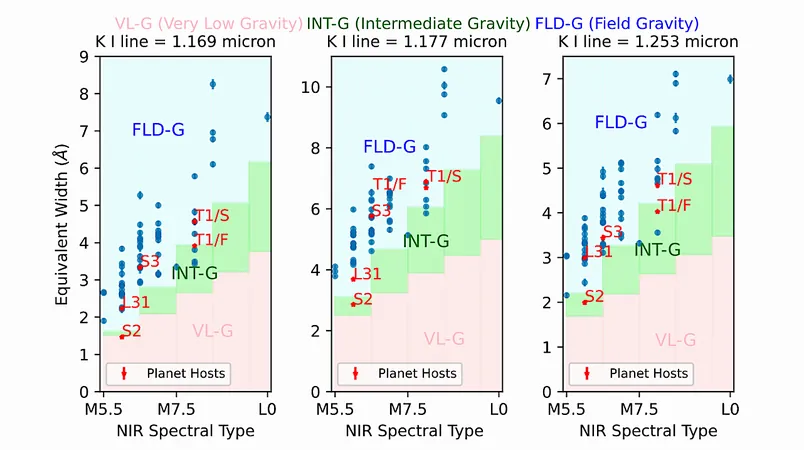
Revolutionary UBC Research Unveils CO2 Capture Technology That Could Transform Earth and Mars
2024-11-08
Author: Michael
Groundbreaking Discovery
In a groundbreaking study, researchers from the University of British Columbia (UBC) have discovered an innovative approach to convert carbon dioxide (CO2) into useful products. This technology not only holds the potential to combat global warming but also paves the way for future colonization efforts on Mars.
Innovative Technology
The research, recently published in the scientific journal Device, reveals that by employing thermoelectric generators that harness temperature differences, the UBC team can effectively transform CO2 into a variety of fuels and chemical compounds. This advancement could significantly aid in mitigating the effects of climate change on Earth, while also providing the materials necessary to support human life on the Red Planet.
Expert Insights
According to Curtis Berlinguette, a chemistry professor at UBC and lead author of the study, "This technology enables CO2 captured from the air to be upgraded into fuels... our reactor utilizes electricity to convert the CO2 into these valuable products." A crucial aspect of their work is the use of energy derived from renewable sources such as solar or wind power, which could make the technology even more sustainable.
Experimental Process
The researchers conducted experiments that involved connecting commercial thermoelectric generators to a standard CO2 electrolyzer. The generators operate on the principle that temperature gradients can produce electricity. By maintaining a temperature difference of at least 40 degrees Celsius between their hot and cold sides, the generators were able to create sufficient electricity to power the conversion process.
Application on Mars
On Mars, the atmosphere is predominantly composed of CO2—approximately 95%—and experiences extreme temperature fluctuations, with readings ranging from a high of 20 degrees Celsius to a chilling -153 degrees Celsius. Berlinguette and his team envision utilizing these temperature differentials to increase voltage and current output, enabling the generation of clean fuels and other carbon-based products essential for a sustainable colony on the Martian surface.
Earthly Benefits
Notably, this research is not limited to extraterrestrial applications. On Earth, the same technology could be invaluable at geothermal power plants, where the substantial temperature differences between hot geothermal fluids and cooler ambient air could be harnessed to generate electricity for CO2 conversion.
Cost-Effective Solution
"The conversion of air into fuels traditionally requires a series of costly steps," Berlinguette explained. "However, our reactor eliminates the need for heat or vacuum conditions by using electricity alone, effectively halving the costs associated with converting air into useful fuels." To advance this venture, they are commercializing their technology through a start-up called Sora Fuel, based in Boston.
Future Prospects
In addition to creating fuel, the CO2 conversion process could yield chemicals that are foundational for producing materials like plastics, further enhancing the feasibility of human settlement on Mars. Thermoelectric generators could even be strategically placed on structures like Martian biodomes, taking advantage of the temperature discrepancies between their interiors and the frigid Martian environment to generate power effectively.
Next Steps
Next on the agenda for the UBC research team is to conduct rigorous testing of their thermoelectric generators in conjunction with electrolyzers here on Earth. This endeavor could lead to new strategies for converting emissions into clean fuels, moving us ever closer to a more sustainable future and addressing the pressing challenges posed by climate change.
Stay Tuned
Stay tuned as this revolutionary research unfolds—who knows how it could influence our approach to both Earth's emissions and Martian colonization efforts!









 Brasil (PT)
Brasil (PT)
 Canada (EN)
Canada (EN)
 Chile (ES)
Chile (ES)
 Česko (CS)
Česko (CS)
 대한민국 (KO)
대한민국 (KO)
 España (ES)
España (ES)
 France (FR)
France (FR)
 Hong Kong (EN)
Hong Kong (EN)
 Italia (IT)
Italia (IT)
 日本 (JA)
日本 (JA)
 Magyarország (HU)
Magyarország (HU)
 Norge (NO)
Norge (NO)
 Polska (PL)
Polska (PL)
 Schweiz (DE)
Schweiz (DE)
 Singapore (EN)
Singapore (EN)
 Sverige (SV)
Sverige (SV)
 Suomi (FI)
Suomi (FI)
 Türkiye (TR)
Türkiye (TR)
 الإمارات العربية المتحدة (AR)
الإمارات العربية المتحدة (AR)